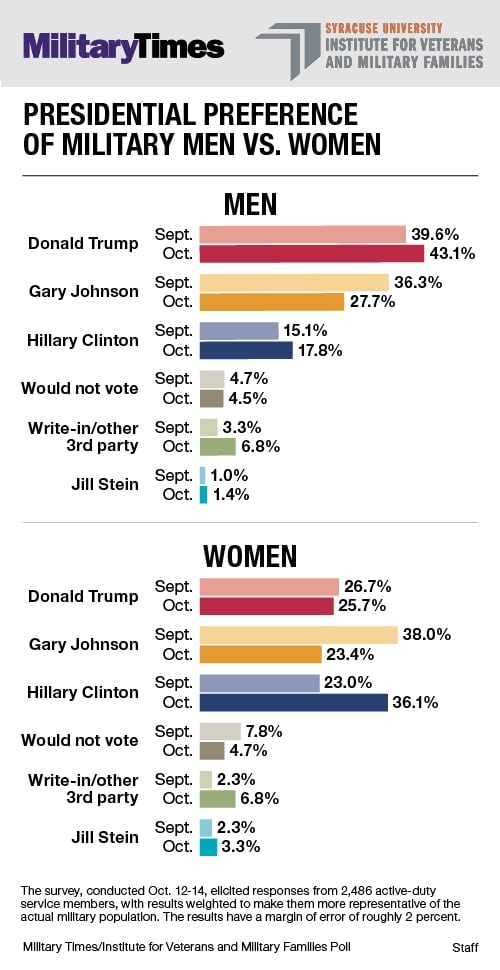The recent scandals surrounding Republican presidential candidate Donald Trump haven't lessened his support among military members, according to the latest Military Times/Institute for Veterans and Military Families poll out this week.
In fact, he appears to be the clear favorite among military voters now.
But allegations of sexual assault and misogyny against the GOP business mogul are hurting his image among military women and eroding his support among military officers, according to poll results.
Meanwhile, Libertarian Party nominee Gary Johnson has seen his support slip among active-duty service members in the wake of a series of foreign policy missteps on the campaign trail. And Democratic presidential candidate Hillary Clinton continues to see her support rise among military officers as the long presidential campaign winds down.
The poll is the second scientific breakdown of voting preferences among service members this election cycle, and again shows a different election in the ranks than one playing out on the broader national stage.
Most national polls show Clinton with a significant lead among likely voters, especially since the first two presidential debates and the concurrent groping and sexual assault accusations from Trump’s past.
But the results of the military poll -- which surveyed nearly 2,500 active-duty troops between Oct. 12 and Oct. 14 -- show more than 40 percent of service members planning to vote for Trump as the next commander in chief. That’s up slightly from September, before his campaign was besieged by the allegations.

More than 62 percent of those surveyed had a very negative opinion of those scandals, but they do not appear to be swaying large groups of troops to change their November ballot choices.
"Everyone is so worried about what Donald Trump has said over a decade ago or about his tax returns over 20 years ago," said one male Marine corporal who responded to the survey. "No one seems to care that Hillary Clinton is directly responsible for leaking classified information.
"It's an embarrassment that she is on the verge of becoming president."
Clinton still trails Johnson in the latest poll, but only by about 7 points this month as opposed to 20 points in September.
But she leads among female service members (36 percent support, to Trump’s 26 percent and Johnson’s 23 percent) and is tied with Johnson among military officers (both around 31 percent, with Trump at 26 percent).

"Trump perpetuates ‘the boys will be boys’ mentality that does not reflect current military culture," wrote one female Army master sergeant. "It's both dangerous and disrespectful."
UNPOPULAR CANDIDATES
Both major parties remain largely unliked by the military. Nearly 83 percent of those surveyed said they are dissatisfied with Clinton as the Democratic Party’s pick to be president, and more than 65 percent said the same of Trump as the Republican nominee.
Only 4 percent of troops polled said they have abundant confidence that Clinton can lead the military as commander in chief. About 9 percent said the same for Trump. More than 60 percent of troops said they had little confidence either could.
"We are currently in a race to the bottom, and it is a sad thing to witness that this is the best leadership options that the nation can bring to the table," wrote one male Navy lieutenant.

Those sentiments echo national polls, which show more than half of voters have an unfavorable opinion of both Clinton and Trump, making them the least popular major party candidates in decades.
Only 30 percent of respondents to the military poll said they had a poor opinion of Johnson, but more than 43 percent expressed no opinion or judgement on his candidacy.
About 5 percent of respondents indicated they do not plan to vote given the likely choices on the ballot this year, and another 7 percent said they will choose a different third-party or write-in candidate.
More than two-thirds of troops said they watched the first presidential debate in September, and about 28 percent said they watched the second two weeks later. Clinton got higher marks for her performance in the first contest, while Trump impressed more troops in the second.
But only one in twenty troops said watching the debates changed their voting preferences for November.
OUR METHODOLOGY
Between Oct. 12 and 14, Military Times and IVMF conducted a voluntary, confidential online survey of U.S. service members. The questions focused on the nation's current political climate, the 2016 presidential election and other relevant issues.
The survey received 2,486 responses from active-duty troops. A standard methodology was used by IVMF analysts to estimate the weights for each individual observation of the survey sample. The margin of error for the presidential preference question is 2 percent. Other questions have slightly higher margins of error.
The survey audience was 85 percent male and 15 percent female, and had a mean age of 29 years old. The respondents identified themselves as 70 percent white, 11 percent Hispanic, 8 percent African American, 4 percent Asian and 8 percent other ethnicities. Respondents were able to select more than one race. Follow @LeoShane
Leo Shane III covers Congress, Veterans Affairs and the White House for Military Times. He can be reached at lshane@militarytimes.com .
George Altman covers military transition issues, education and post-separation employment and entrepreneurship for Military Times. He can be reached at galtman@militarytimes.com
Leo covers Congress, Veterans Affairs and the White House for Military Times. He has covered Washington, D.C. since 2004, focusing on military personnel and veterans policies. His work has earned numerous honors, including a 2009 Polk award, a 2010 National Headliner Award, the IAVA Leadership in Journalism award and the VFW News Media award.









